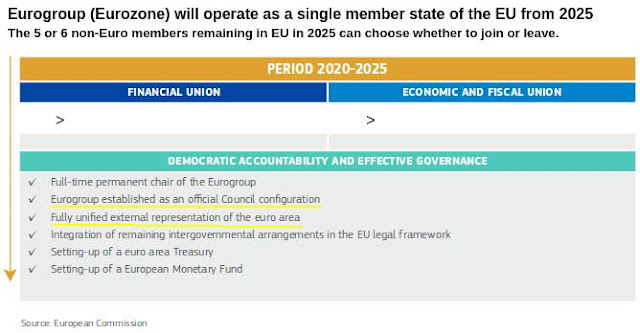What has Brexit done to the EU? The answer is simple, it has accelerated the move towards EU political union where the EU operates as a single state. This concept is fully supported by Merkel and the new, pro-EU French President, Macron. The two leaders are in such agreement on this issue that they are nicknamed "Merkron" in the EU.
There are 19 members of the Eurozone out of 28 countries in the EU. The UK is already regarded by EU policymakers as having left the Union so the Eurozone is now the major, unopposed power in the EU (it includes Germany, France, Spain and Italy). The Eurozone is being renamed the Eurogroup and it is planned that it will operate as a single State by 2025:
After 2025 the EU will consist of the new country, the Eurogroup, with a handful of satellite Nations such as Denmark. The individual States within the Eurogroup will have a status similar to the individual States in the United States of America. The desire to give up sovereignty that exists in most EU countries will have been achieved.
This new country will need an army. The EU Council meeting in June resulted in an agreement for a full EU defence union - see EU Leaders hail historic step in defence cooperation. This entails over 5 billion Euros pa of funding now, to be followed by the activation of the Permanent Structured Cooperation (PESCO) on Defence. PESCO was agreed in the Lisbon Treaty but blocked by the UK. The EU will move towards replacing the various national memberships of NATO with a single Eurogroup membership after 2025 under Article 42 of the EU Treaty. PESCO really means setting up a European Army.
Merkel and Macron have announced that they are preparing a joint policy for increased Union (See France and Germany to make joint proposal for the future of Europe). This will be presented at the end of September.
There can be absolutely no doubt: the EU is headed for full political union with member states operating as regions. This is critical for the functioning of the Common Market (called the Single Market since 1993) because the new Nation, the EU, will have total control of it after 2025. "Staying in the Single Market" will be equivalent to handing our economy to the EU, a foreign country with its own interests and imperatives.
If you voted Remain in the referendum did you really intend to consign the settled people of the UK, your parents and neighbours, to being in a powerless, homogenized region of another country, the EU?
See The EU Single Market - Good or Bad for the UK?
What the EU is really, really about
No-one questions the desire of the Scots to resurrect a nation from 1700 AD but anyone who compares the architecture of Madrid, Prague and Vienna will see the "common European culture":
There are 19 members of the Eurozone out of 28 countries in the EU. The UK is already regarded by EU policymakers as having left the Union so the Eurozone is now the major, unopposed power in the EU (it includes Germany, France, Spain and Italy). The Eurozone is being renamed the Eurogroup and it is planned that it will operate as a single State by 2025:
 |
| EU Commission paper on future of Eurozone |
This new country will need an army. The EU Council meeting in June resulted in an agreement for a full EU defence union - see EU Leaders hail historic step in defence cooperation. This entails over 5 billion Euros pa of funding now, to be followed by the activation of the Permanent Structured Cooperation (PESCO) on Defence. PESCO was agreed in the Lisbon Treaty but blocked by the UK. The EU will move towards replacing the various national memberships of NATO with a single Eurogroup membership after 2025 under Article 42 of the EU Treaty. PESCO really means setting up a European Army.
 |
| EU Battle Group |
Merkel and Macron have announced that they are preparing a joint policy for increased Union (See France and Germany to make joint proposal for the future of Europe). This will be presented at the end of September.
There can be absolutely no doubt: the EU is headed for full political union with member states operating as regions. This is critical for the functioning of the Common Market (called the Single Market since 1993) because the new Nation, the EU, will have total control of it after 2025. "Staying in the Single Market" will be equivalent to handing our economy to the EU, a foreign country with its own interests and imperatives.
If you voted Remain in the referendum did you really intend to consign the settled people of the UK, your parents and neighbours, to being in a powerless, homogenized region of another country, the EU?
See The EU Single Market - Good or Bad for the UK?
What the EU is really, really about
No-one questions the desire of the Scots to resurrect a nation from 1700 AD but anyone who compares the architecture of Madrid, Prague and Vienna will see the "common European culture":
 |
| Habsburg Empire 1700 AD |

Comments